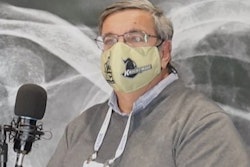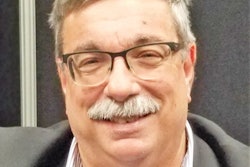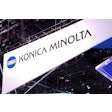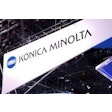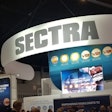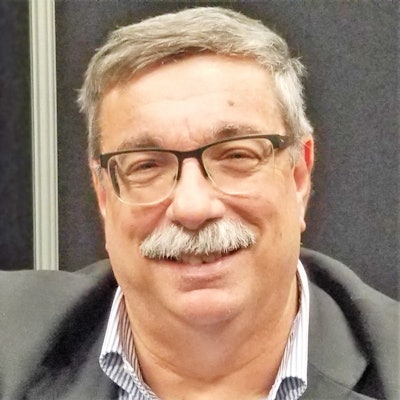
When the RSNA announced it was going virtual this year, I just kinda smiled and said, "No problem. I know all about virtual." Being divorced longer than many people have been married, "virtuality" (not to be confused with virtue) has pretty much defined my social life.
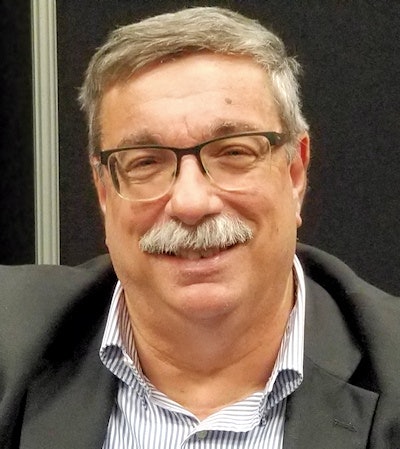 The PACSman, Mike Cannavo.
The PACSman, Mike Cannavo.I have to say I do miss the old RSNA. I never thought I would say this, but I miss the cold, the tired feet, the press room food, and most of all the people talking about me behind my back when I haven't gone more than 10 feet away from their booth. But some things you just have to give up to live in the virtual world.
Is RSNA 2020 better than in years past? Well, it's a 2020 event -- so that pretty much summarizes it. In some respects, RSNA 2020 was better. I got to see the poster sessions for more than a fleeting glance, got to sit in on sessions I never had time for, and got to look at presentations and demonstrations I wanted to instead of those I felt I was obligated to look at.
On the negative side, with so many new companies out there, I had to read the blurbs each company put out about themselves to try and figure out what they did. Most would have failed third-grade English (that is, if they still teach that these days).
The run-on sentences, lack of punctuation, and word combinations that perplexed even Google Translate were special. Weirder still, more than half the companies identified marketing people as their primary contacts. (Note to sales: Be afraid. Be very afraid.)
Having to provide your life history at a vendor's site before you could get more information -- or, God forbid, actually chat with someone -- turned me off in a big way as well. I checked with my geek son and yes, just like you could scan a badge physically, you can electronically download this information into a company's database. So RSNA, if you don't do this already, you should -- unless you do and I just haven't figured out how to do it, that is.
So what was RSNA 2020 about? One theme, two words: artificial intelligence (AI). Over 45% of the 235 vendors exhibiting virtually indicated they had an AI solution in one form or another. These 107 vendors were close in number to last year, when there were nearly 750 physical vendors.
Why the difference? Well, for one, the RSNA didn't limit companies to just a few areas in which they could identify themselves, as in years past. So many had 10, 20, and even 30 areas where they classified their offerings.
The primary reason for the difference is that AI is a hot technology, pure and simple. There also is more venture capital money out there than you can imagine just waiting to be scooped up if you say you have anything relating to AI.
I thought about changing my moniker to PACSmanAI or AIPACSman so I could get $5 million in venture capital funds invested in me. But I'm not big on doing a jail term for defrauding investors, so I'll pass -- even though I could do a better job at AI than companies showing do.
Sadly, there is still no way of telling what is real in AI and what is not. There is still no requirement to state if a 510(k) has been issued or even filed for. That is beyond frustrating when looking at companies whose software you think you can use to implement the technology clinically. Last year at RSNA 2019, about one-third (if that) of companies exhibiting in the AI Showcase actually had 510(k) clearances for their software. This year we may be up to half, maybe -- but that number remains to be seen.
The number of COVID-19-related AI algorithms that have been developed is staggering -- well over a dozen -- yet few are seen in practice and fewer still are being clinically used. There is one company allowing end users to use their COVID-19 algorithm for free. This is a brilliant move from a marketing perspective.
Interestingly, the imaging and AI marketplace has failed to capitalize on the use of AI with imaging modalities as an alternative to the polymerase chain reaction (PCR) lab tests and the lower-sensitivity rapid COVID-19 tests that have become so prevalent lately. A standard chest x-ray interpreted by AI (one of the few places I would accept a nonradiologist interpretation) can actually be cheaper than what is being charged to Medicare, Medicaid, and insurers now for standard swab-based testing. Have we capitalized on it yet? No.
The number of partnerships is increasing as well, showing that two heads (or two companies) are better than one. This is a trend that is growing and will continue to grow. There have been some mergers and acquisitions as well, but it doesn't seem like nearly as many as in years past.
I could go on, but let's cut to the chase -- the 2020 PACSman Awards.
The Otis Award
To all the companies that wouldn't know an elevator pitch if it bit them in the backside. I have seen write-ups that made War and Peace look like Fun With Dick and Jane. If you can't tell me about your product in 15 seconds or less, please save it.
The Geography Major Award
To the company that said it was headquartered in Solon, America, (ummm ... there are five cities named Solon in America) and to the company that described Beijing as being "the ancient capital of China." Gee, thanks! I didn't know that.
The Insignificant Award
To the companies that addressed "clinically significant cancer" and medicines for "serious medical conditions." I can hear it now: "Don't worry, Mrs. Thompson -- your cancer is clinically insignificant and the medicine I was going to prescribe you is only for serious medical conditions, so it looks like today is your lucky day!"
The Do They Know It's Christmas? Award
The year was 1985. Bob Geldof and some of the best musical artists in the world got together to raise $127 million for famine relief in Africa. The event was called Live Aid. This award goes to the company that dared to call one of its products by the same name. You guys are not even close.
The Frank Zappa Award
To the company calling its product Moonbeam. Now Frank had the market on Dweezil, Diva, and Ahmet, as well as Moon Unit, so Moonbeam would have fit right in there.
The Right Back Where We Started From Award
A song by the same name was a hit back in the disco-crazy '70s, but companies using the number 360 in their advertising trying to stay alive may not realize that what goes around comes around.
The Who Cares Award
To the companies that boast being "founded by a neurologist" or "the youngest radiologist on record in the U.S." So?
The Size Doesn't Matter Award
To every company that promotes in its write-up the number of employees it has, the total square footage it occupies, or how long it has been in business ("Five years before Roentgen, we invented the first C-arm"). A first cousin to them is the Longer Is Better Award, to those companies that write six paragraphs when four lines or less will suffice.
The Huh? Award
To companies that think we know all about them already and because of that say absolutely nothing about what they offer or even who they are. Examples: "We see beyond the bigger picture," "Patients are at the center of all we do," and so many more. So tell me -- what do you really do?
The Two Doors Down, Make a Left Award
To companies that keep promoting their veterinary products at a radiology show. Soieee!
The Pass Me That Doobie Award
To the company that said it can "reduce patient wait times by 100%." Next time I go to my doctor, I'm gonna walk right in and be led to the room where my doctor is patiently waiting on me. Uh-huh. Stop bogarting that doobie, will ya?
The WTF Award
To the company that described itself this way: "Aptitude to innovation and design ability: [this vendor] conceives each product conflating its consolidated know-how with the vision of the future." Maybe if I had some of that doobie I would understand it better. Or maybe not.
The Democracy Award
To the two companies that wanted to "democratize procedures" and "democratize data-driven medicine." I wonder if they are both located in blue states. Next year we'll Republicanize them.
The We Don't Need No Stinking Chat Box Award
To too many vendors that had a chat box in their virtual exhibit and still haven't answered my question four hours later: "Your call is important to us. Please stay on the line while we ..."
And finally, this year's 2020 PACSman Award winner:
The Peggy Lee Award
To those who loved the virtual format over actually meeting in person. Peggy sang it best:
If that's all there is my friends, then let's keep dancing
Let's break out the booze and have a ball
If that's all there is
See you next year -- in person -- in Chicago. And by damn, someone is buying me dinner at Fogo de Chão, too, instead of the Sonic burger I'm having tonight. Will it be you?
Michael J. Cannavo is known industry-wide as the PACSman. After several decades as an independent PACS consultant, he worked as both a strategic accounts manager and solutions architect with two major PACS vendors. He has now made it back safely from the dark side and is sharing his observations.
His healthcare consulting services for end users include PACS optimization services, system upgrade and proposal reviews, contract reviews, and other areas. The PACSman is also working with imaging and IT vendors developing market-focused messaging as well as sales training programs. He can be reached at [email protected] or by phone at 407-359-0191.
The comments and observations expressed are those of the author and do not necessarily reflect the opinions of AuntMinnie.com.






